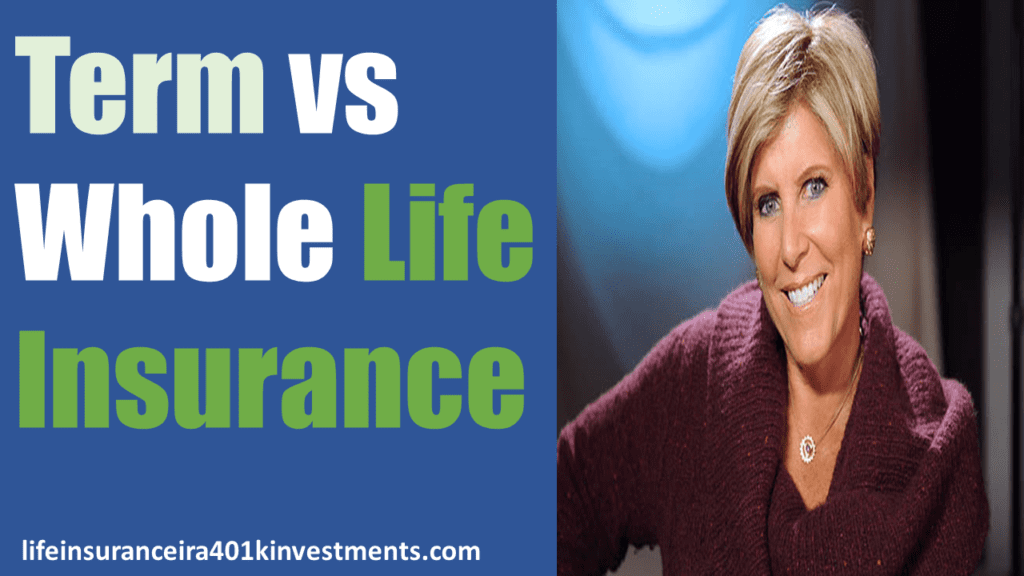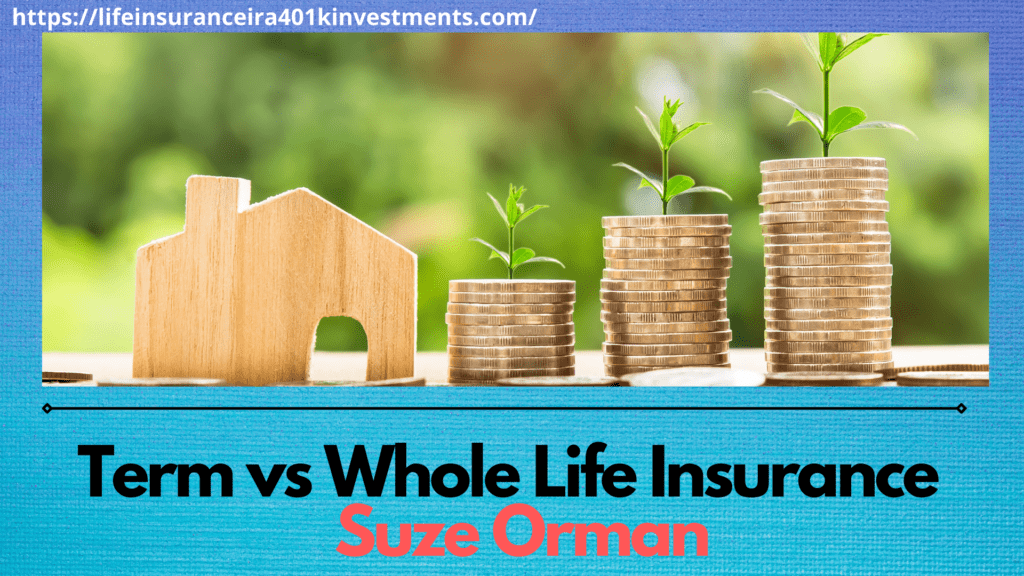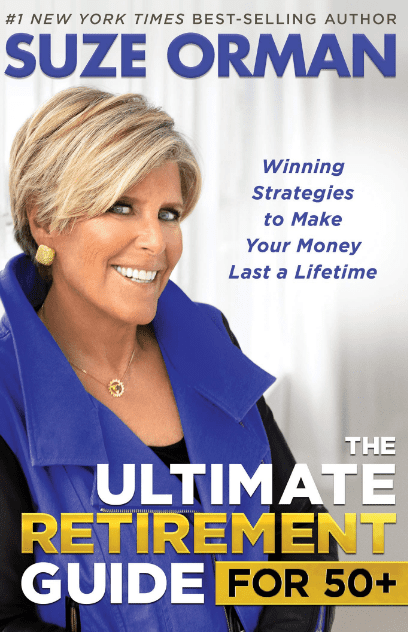Term vs Whole Life Insurance Suze Orman
The dollars you pay while enrolling for term life insurance premiums and they are only there to provide a death benefit to your beneficiaries. If you die during a specific period.
Why do Suze Orman and Dave Ramsey recommend term life insurance?
While the money you invest in total life insurance premiums generates a cash value that you can use later in life or that will add to the death benefit payment. Let’s found out Term vs Whole Life Insurance Quotes in the below link Here.

Term vs Whole Life Insurance
Get Suze Orman is not a person to waste time when it comes to giving money advice. Suze is shaking her finger at people who buy full life insurance. These days. the philosophy focuses on the basics of financial management, which is what most people need.
Your message about the whole life insurance is also basic. She says you don’t need it.

In fact, she has advised people who come to his program to provide financial advice to fire consultants. Who has sold them full life insurance or promote term against whole life insurance.
“Find yourself a new financial advisor!” -Orman.
Whole Life Insurance Tips
Whole life insurance is on Orman’s self-styled “hate list” of investment products. Suze Orman points out that life insurance does no good for most people. But it covers the pockets of the seller working on behalf.
- 10 Year Term Life Insurance Policy Quote and Rate.
- 20 Year Term Life Insurance Policy Quote and Rate.
- 30 Year Term Life Insurance Policy Quote and Rate.
Suze explains that the three types of term vs whole life insurance (universal, comprehensive, and variable) are equally bad investments. Life insurance is not supposed to be an investment, she says. It is an emergency plan. It’s a financial product that you buy, hoping you never have to use it.
“In many cases you only need life insurance for a less time period of time. Perhaps until the children are adults, or until you have saved enough fortune to make your spouse. Or other dependent persons can live on the income from these assets.
Recommend Term Life Insurance
Suze strongly recommend that most families only need term life insurance. As the name suggests, it only takes one specific term. That can be five years, ten years or 20 years or more.
If the person die during the term, the policy pays a death benefit. Due to the limited duration of the term vs whole life insurance policy, term life insurance over 70 to 80 is a lot affordable. I promise you will be amazed at how much protection you can buy for a very small sum. “
Orman’s audience is made up of regular hardworking people who are learning about personal finances. And trying to make the right decisions about their money. She speaks directly to them with her famous motto: “People first, then money, then things.”

What kind of life insurance do you suggest buying Suze Orman?
In an article posted on his term vs whole life insurance website on February 9, 2017, Orman gives this advice:
“Chocolate and roses are classic Valentine’s Day gifts. But I am serious when I tell you that the most loving and caring gift. For protecting your loved ones, you need life insurance.
I know i know Not exactly romantic. But in terms of material things that we can buy for others. You can’t tell me that there is something that offers more protection and tranquility.
However, a recent survey shows that many parents with children do not have life insurance. And a significant portion of the insured families have coverage of $ 100,000 or less.
Cheap Life Insurance For Family
She goes on to say that families with children need a death benefit.
For both parents this corresponds to 20-25 times the annual income to be replaced. If the beneficiary [RM2] of this large term vs whole life insurance policy reverses the payment conservatively, it is possible to live off the interest payments for a long time.
If buying that cheap life insurance sounds like an expensive project. Keep in mind that in good health, a 30-year-old woman could get 750,000-year life insurance for less than $ 800 a year. This amount of money protects her family from financial difficulties if she dies while her children are still in school.
Cheap life insurance gives your surviving partner enough money to pay off the mortgage and all the household debt. Invest the rest of the payment and live on the interest payments. It also means that your family will not have to go into debt to cover your funeral and burial expenses.
Compare Whole vs. Term Life Insurance
Many people buy whole life insurance because it seems to be an easy way to force themselves to save money. You receive a hybrid product that includes a life insurance component and a savings component. Orman says this approach to money is wrong.
“You will never be powerful in life until you are powerful with your own money,”. He spoke to the audience at the eMerge Americas 2017 conference. “How do you think about it, how do you feel about it, and how do you invest it.”
Obtaining a term life insurance policy to protect your family. Starting from financial difficulties has never been easier than it is now. The process is simple and direct. Answer some quick questions and you’re on your way to purchasing the type of term vs whole life insurance recommended by respected financial advisers.
Suze Orman’s current views on term versus whole insurance
Suze Orman by selling life insurance as a financial advisor. Suze has changed her thought and instead advises people to buy a term and invest the difference instead of buying permanent life insurance products like whole life.

Suze thinks permanent life insurance like whole life or indexed universal life (IUF) is a bad investment. Like other financial artists like Dave Ramsey. In his opinion, it is better to invest the money he will save on buying cheaper money.
Even if she doesn’t make all the difference, her claim is that it would be better to spend it somewhere else. To not look at what she sees as the lifetime high fees.
While there is no doubt that there are situations in which an individual receives a better service by purchasing term life insurance versus full life insurance. Or other cash insurance, there are several benefits to be gained by purchasing these products. That Suze doesn’t address.
Insurance Advice Benefits
As a result, his position on the matter has been criticized by some insurance experts as overly simplistic.
Her advice to investors to fire their advisers if they recommend full life insurance. Or other types of permanent coverage also seems extreme.
And while we agree with Suze Orman that life insurance is not intended to be an investment. This overlooks the fact that permanent insurance in the form of cash-value life insurance has a number of characteristics that make it an excellent alternative saving vehicle in many situations.
There are a handful of reasons why these financial experts focus on term life insurance versus full life insurance.
- Term Life is cheaper than all life
- It is more profitable for Ramsey and Orman
- Obvious bias to the benefits of a lifetime
- Term Life is cheaper than all life
Of course, the initial cost of setting a term against whole life would favor term life insurance. But throughout life, whole life insurance costs much less than term life.
It is more profitable for Ramsey and Orman
The historical internal rate of return of a properly designed whole life policy can typically be between 4-6%. That is your money that grows throughout your life, which can be accessed tax-free through policy loans.
Both Dave Ramsey have a vested interest in driving life to term vs whole life insurance plans. For Dave, that is demonstrated through his relationship with Zander Insurance.
For Suze, her relationship with Select Quote, an online term life insurance agency. Makes it advantageous for her to continue to drive term life.
Obvious Bias to the Benefits of a Lifetime
According to them or not, all you have to do is listen to them speak out against full life insurance to hear. The obvious bias that Ramsey and Orman have toward life.
They unequivocally indicate that they hate all life and that anyone who recommends it is not in their best interest. And they never mention any of the many benefits of life insurance.
And what do they recommend you do instead? Why give all your money to Wall Street, of course. So that stockbrokers and mutual fund managers can use their money to get rich,
And what do they recommend you do instead? Why give all your money to Wall Street, of course, so that stockbrokers and mutual fund managers can use their money to get rich. Why put off using your money to some magical day over the rainbow in a land called retirement.
Suze Orman’s Life Insurance in The Past
Orman explained how, when she was working as a financial advisor. Her clients did well by selling them a lifetime premium insurance (SPWL). She recommended this product at the retirement seminars. She gave and found that it was very helpful in developing her practice.
In an interview with Success.com, he said, regarding SPWL: “I loved it! It was one of the largest investments in the world. “She promoted the low risk and high return on the product and favorable tax treatment. (1)
What explains the radical change in Suze’s views on life insurance? It could have to do with the audience you are now targeting. Since many of his listeners are probably not sophisticated when it comes to financial matters.
Advice For Term vs whole life insurance
Orman may feel that he will not be able to fully explain to them the complexities of cash value term vs whole life insurance. So even if there are certain circumstances where buying permanent life insurance is advantageous. Delivering this kind of nuanced message is not Orman’s way.
However, given his lifelong past embrace, it makes sense to be skeptical of his pronouncement against all life. While in her role as a financial guru to the masses, she condemns her entire life.
The fact that she was an advocate for the insurance product when working with investors face-to-face reinforces the case for following her current advice to stay away from the cash value of life insurance with a grain of salt.
The Case for Life and Other Types of Cash Value Life Insurance
Term life insurance is the easiest to understand and has the lowest prices. It covers you for a fixed period of time, like 10, 20 or 30 years. You can get life insurance quotes online. Whole life insurance is more complex and tends to cost more than the term, but offers additional benefits.
While buying a term life and investing the difference may work for some investors, for others. The benefits associated with buying a lifetime and other permanent life policies make such policies worth considering.
Chief among these benefits is the ability to use a cash value policy. Such as lifetime participation to act as your own banker by taking out a policy loan from your account while earning interest on your remaining balance.
Other Benefits of Cash Value Insurance Include:
Tax-Driven Growth: Interest paid on your principle in the cash value account of a permanent life insurance policy grows tax-free. Allowing you to achieve true compound interest growth. Everything else the same, this allows these funds to grow faster than if they were in a taxable account.
Flexible Premiums: Universal life insurance, a form of cash value insurance. Allows you to adjust the amount of the premium you pay if conditions change.
The ability to access the cash account through partial withdrawals or policy loans – whether you choose to take a partial withdrawal from the cash account. Or a life insurance policy loan, you can access your funds tax-free up to the amount contributed to the account.
Tax-free distributions to beneficiaries – If you buy a term life and let it expire after a certain period of time. Any assets you leave with your term vs whole life insurance beneficiaries will generally be subject to potential taxes, while life insurance income is free tax for beneficiaries.
UIL vs VUL Life Insurance
Growth potential linked to the stock market: both UIL (universal indexed life) and VUL (variable universal life) insurance offer the opportunity to earn interest based on the performance of various stock market indices.
In the case of IUL, the amount credited to your account is generally limited by the limit and participation fees, while VUL subaccounts invest directly in equity securities, so there is no such limitation.
However, IUL generally offers a minimum fee that serves as the minimum that an account can earn in a year (generally not less than 0%). Because the minimum fees generally do not apply to VUL subaccounts.
They can lose money during any period when the stock market declines, making these subaccounts a riskier option than IUL.
Life Insurance Quotes
When term vs whole life insurance is used as a savings or investment vehicle, every effort should be made to avoid the policy being classified as an MEC (modified endowment contract).
Which would cause withdrawals taken from the policy is subject to tax. Most of these policies are designed to prevent this, however it remains.
- Term vs Whole Life Insurance Suze Orman Advice and Save Money Free Quotes.
